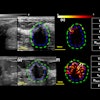Putting a comprehensive workplace breast cancer screening intervention program in place in China can lead to increased rates of mammography compliance -- good news, as breast cancer continues to be the primary cause of death among East and Southeast Asian women, a study reported this month in Cancer Epidemiology, Biomarkers & Prevention.
Lead author Grace Ma, PhD, of Temple University and colleagues examined the effects of a workplace intervention on breast cancer screening rates at eight worksites in Nanjing, four of which were assigned to the intervention group (n = 232) and four to the control group (n = 221).
The intervention group received breast cancer education and help with obtaining screening. The control group was provided with general cancer education and received a delayed intervention after completion of the study, Ma and colleagues wrote. The team assessed mammography rates pre- and postprogram and at six months of follow-up (Cancer Epidemiol Biomarkers Prev, February 2012, Vol. 21:2, pp. 358-367).
Baseline mammography use was low among both the intervention and control groups, but exposure to the workplace intervention dramatically increased the uptake of mammography -- from 10.3% at baseline to 72.6% at six-month follow-up in the intervention group, Ma's group found.
"A workplace-based [screening mammography] intervention could have a strong impact in breast cancer prevention and early detection among women in China," Ma and colleagues wrote.



















